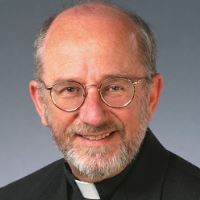Commentary on 1 Timothy 2:1-7
These verses near the beginning of what’s known as the Pastoral Epistles—that is, 1 and 2 Timothy and Titus—specify some of the intentions that believers today should keep in mind regarding the community’s prayer, even if the verses that follow this passage are more explicit and prescriptive in reference to the proper mode of community worship.
The prayer is for everyone, expressing the Pastoral Epistles’ concern for universal salvation. It was a foundational understanding of the aim of Jesus’ preaching, death, and resurrection that Jesus wished all to be saved (Mark 10:45) and to know and follow Jesus’ teachings (Matthew 28:19-20). By recalling this goal of the Christian mission here in verse 4, 1 Timothy shakes the community out of whatever complacency it may have fallen into.
There is a great and noble task ahead of them and they are just at the starting point of embarking on the work of accomplishing it. A number of suitable persons in the community have stepped forward to take on the task of leadership, as evidenced by the list of qualifications by which to distinguish the most capable among them (1 Timothy 3:1-13).
From the outset of the letter, the whole community, as well as its leadership candidates, are reminded of the larger work of evangelization that they are to engage in. The effort of the letter to keep the community’s focus on the plan God has for all people serves to counterbalance the inward concern for their own virtuous life. Such a reminder is salutary for Christians of every age. While attending to ourselves and the integrity of our life of faith, we cannot let this effort eclipse the larger goal of bringing the message of Jesus to the world around us.
The pluralistic country that we live in mirrors that of the first-century Roman Empire of the Pastoral Epistles. As a result of migration (both chosen by those with economic means, and forced by war and slavery), the setting for this letter is a remarkably diverse populations in urban areas, which is precisely where Christianity finds its roots. Christians themselves were a minority in Roman times, and were but one ingredient in the ethnic and religious mix of the time. They also were diverse in terms of class in that household owners mixed with their day laborers and slaves in the community. Christians were aware of their precarious position as a small community of persons whose countercultural moral values (marital fidelity, sexual restraint), religious views (monotheistic in a pagan milieu), and political detachment (their “citizenship is in heaven” as described in Philippians 3:20) exposed them both to ridicule and even persecution (1 Thessalonians 2:14-16).
Similarly today, Christians both in the U.S. and throughout the world find themselves at odds with prevailing social norms and government policies and actions. The low profile prized here might be applicable even today but might prove inadequate as a defense or an evangelical witness.
First Timothy also calls for prayer for public officials and rulers (see Romans 13:1-7). This suggests the precarious condition of the early Christian house churches vis-à-vis the local and imperial government. Tranquility, devotion, and dignity express the ideal religious and social life of the community and at the same time recommend the community as offering no disturbance to the public order.
On the contrary the community advances social and political values that the officials would find useful for their efforts at governance. The concern for good reputation is a common theme in the Pastoral Epistles among the qualifications for community officials as well in the obligations incumbent on members of the households (1 Timothy 3:2, 7). So too today the countercultural values require for its credibility that the community provide no occasion for dismissive criticism on the grounds of perceived hypocrisy.
Of course, the call for prayer is not just in view of these inward looking considerations but rather looks to the spiritual welfare of those of the majority population and its leaders. God’s opinion—and not society’s—is primary in verse 4, which sees the virtuous characteristics of the community members as fitting with God’s plan for universal salvation.
The fundamental belief in one God and in Jesus the one mediator who died as a ransom for humanity is the essential fact that all who believe must know and accept. Getting neighbors and even family members to believe this is an uphill struggle for the community of the Pastorals, just as it is today. The fundamental belief in Jesus as dying for our justification and then rising from the dead was a tough nut to swallow for the pagans who did not have a clear grasp of or even less an expectation of life after death (Acts 17:18-20, 32).
And even today, we cannot take for granted that those professing to be Christians accept these teachings as true much less those taken up by a worldview formed by scientism. Nonetheless, the Pastoral Epistles maintain that faith includes correct knowledge throughout these letters (see Titus 2:10) and is the revealed testimony of Jesus and those who follow him. In the first generations of Christianity, the community was working through the kerygmatic preaching and teaching as they came to know who Jesus was and what Jesus’ relationship was to God the Father, as well as how Jesus’ life, death, and resurrection affected their own relationship with God and prospects for life now and forever.
In later times, such as ours, we have the challenge to keep up the struggle to understand these same realities in terms that make sense to us and to our neighbors today. It is important to go beneath the level of formulation to the level of interior understanding of what Jesus means for us and then to try to express this to others.
We find here a concise statement of Paul’s preaching. He realizes that he was appointed by God (the passive voice of the verb suggests this) to the task. He underlines the truth of this claim by juxtaposing his self-defense with the demonstration of his Gentile mission work. As he preaches the faith, he also transmits the fundamental truths of Christianity.


September 22, 2019